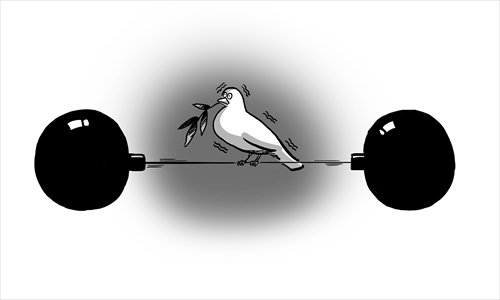Korean crisis rumbles on to no avail

North Korea warns of the imminent danger of attack from the US and promises merciless retaliation, using perfected and miniaturized nuclear devices.
Pyongyang and other cities have seen large demonstrations of troops and civilians. Some embassies report receiving warnings that their safety cannot be guaranteed and that they have been asked what help they would need in leaving.
Restrictions at the joint North-South Industrial Park just across the Korean Demilitarized Zone at Kaesong have prevented South Korean staff from crossing into North Korea, and North Korean workers reportedly failed to turn up at Kaesong. The US has flown nuclear-capable aircraft, including stealth bombers, over South Korea as part of "Foal Eagle," probably the world's largest military exercise.
The world's media is having a field day, with archive pictures of rockets on parade, charts showing the theoretical range of rockets, some of which have never flown, and dramatic shots of demonstrators shouting anti-US slogans. In the world of blogging, suggestions that a cooler approach might be more helpful provoke outcries against appeasement.
The sound and fury seem somewhat divorced from reality. Closer to the action, things seem less frenzied.
Contacts in Pyongyang report no unusual activity apart from the demonstrations.
The air raid practices and the appearance of a few vehicles with camouflage netting have been regular features during the US-South Korean military exercises that have been held for some 30 years. Most of those in uniform in Pyongyang carry nothing more lethal than a spade and are engaged in construction work.
In Seoul too, life seems to be continuing on as normal. There may be some apprehension of a possible incident, but nobody expects it to go beyond that.
Against this background, the new US Secretary of State, John Kerry, kicks off his first trip to Asia since taking office, visiting South Korea, Japan and China after the G8 Summit ended on Thursday in London.
The visit was no doubt planned before the present crisis erupted, but it comes at an opportune moment.
One of Kerry's principal tasks will be to bolster US assurances to its allies that there will be no reduction of support in the face of North Korean bellicosity.
In China, the message will be different. Kerry will want to assure the Chinese that recent US moves against North Korea are not directed at China. And he will also seek to get China to do more to restrain North Korean activities.
Following the recent North Korean nuclear test, China was cooperative over the latest round of UN sanctions. This has led to a widespread belief that China, unhappy with North Korea's public flouting of its advice not to conduct missile or nuclear tests, may now be ready to end or reduce its political and economic involvement with the North.
This may be an overly optimistic view of China's position.
Whatever its views of North Korea, which are complex and nuanced, China has consistently called for restraint from all sides.
For the Chinese, the solution to the current problem is for all sides to stop raising the tension with shows of military might and return to the negotiating table.
And, despite all the noises, there are signs that this might happen.
The North Koreans have not put their forces on a war footing. All the things they have claimed to have done, from abandoning the 1953 Korean Armistice Agreement, to declaring a state of war with the South, and restricting access at Kaesong, have been done before and have been reversed in reality, if not always in words.
The US, having made its point with stealth bombers, has postponed a planned intercontinental ballistic missile test. The military exercises will soon be drawing to a close.
All sides can claim victory.
The US has shown that it is prepared to use force if necessary, but there has been no US attack on the North (not that one wasplanned). South Korea's new president has not buckled under the North's threats. In his own eyes, North Korea's Kim Jong-un has proved himself a worthy successor to his father and grandfather. Now if Kerry did a Kissinger and diverted to Pyongyang…
The author is a research associate at the Centre of Korean Studies, University of London, and formerly a British diplomat in North Korea. opinion@globaltimes.com.cn